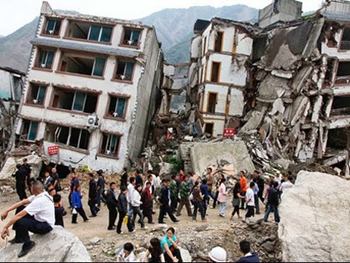 Longtoushan/China, Aug 5: More than 400 people have died in an earthquake that devastated a Chinese village, state media said on Tuesday, as relatives faced the stark probability that rescuers would only find the remains of their loved ones.
Longtoushan/China, Aug 5: More than 400 people have died in an earthquake that devastated a Chinese village, state media said on Tuesday, as relatives faced the stark probability that rescuers would only find the remains of their loved ones.
The death toll in the southwestern province of Yunnan had risen to 407, state broadcaster CCTV said on a verified Twitter account, as concerns mounted over a barrier lake formed by a landslide blocking a river in the disaster zone.
Some state media reports speculated that the swollen waters may burst within days, potentially flooding the downstream area.
Two days after a magnitude 6.1 tremor destroyed 80,000 houses and seriously damaged 124,000 more, rescuers searched the rubble in the devastated, once-idyllic mountainside village of Longtoushan.
Li Shanyan watched anxiously as they dug through the debris of her home in Longtoushan, the epicentre of the quake, searching for her 71-year-old aunt.
"We could still hear her yesterday morning," said Li, 35. "(The rescuers) dug for a whole day and couldn't find her." The house is made of yellow earth, with a tiled roof.
"It was flattened, all flattened," she said. "We couldn't salvage anything -- all was buried in there. Everything is reduced to ruins.
"It's just like Wenchuan in 2008," she added, referring to the huge earthquake in neighbouring Sichuan province that killed more than 80,000 people, China's deadliest quake since 1950.
Moments later, she sobbed as rescuers dug out her aunt's lifeless body from under the wreckage.
Widespread devastation
More than 18,000 rescuers were deployed in Yunnan, and Chinese Premier Li Keqiang visited the disaster zone on Monday.
"With each life saved, there will be one more happy family," Li told soldiers, according to the state-run China Daily newspaper.
Relatives of the dead will receive 20,000 yuan ($3,200) in compensation, state media said.
As the sun shone over Longtoushan -- which has a population of more than 50,000 -- during the morning, the huge extent of devastation on a 600-metre hillside swathe of the township became more visible.
Nearly every building in that area, some of them five stories high, was almost entirely demolished by the quake, giving the appearance that the ground underneath them gave way entirely.
Many of the more modern buildings in the centre of Longtoushan appeared to be less severely damaged, but brick and old-style wooden houses were seriously affected.
The China Earthquake Administration pointed to the area's population density and fragile building materials as contributing to the quake's destruction.
"Most rural houses were made of brick or wood, were not designed to be resistant to quakes, and many of them were outdated," it said, according to the official Xinhua news agency.
A landslide on a nearby mountain two weeks ago has also hampered the relief effort, residents said, leaving a small bridge the only connection between Longtoushan and the outside world.
"Water in the wells is all tainted with mud," said Li Shanyan. "The government distributes a little (food and water), which we give to old people and children first."
Each adult has about a half a bottle of water each day, she added.
"I feel too sad to eat, though there is not much to eat anyway.






Comments
Add new comment